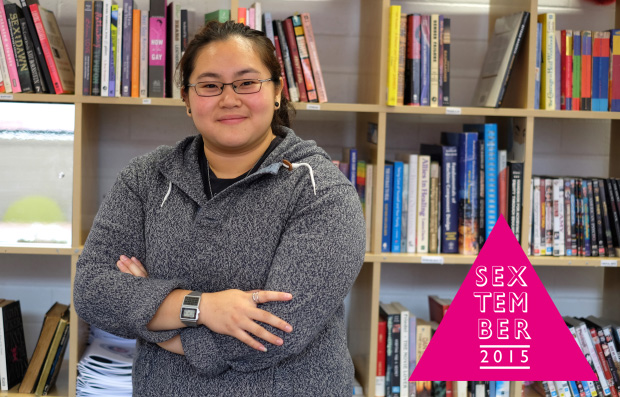SEXtember: How queer advocacy has empowered RMIT’s Queer Department
FOR years, RMIT University Student Union’s Queer Department have lobbied for change and development to better represent queer students of the university. Trinh Le caught up with RMIT’s Queer Officer Ai Vee Goh to talk about the importance of queer advocacy.
I’m standing inside the Queer Lounge, a small cozy room nestled along a dimly-lit corridor on the fourth level of Building 57 at RMIT University. It has a large TV, a kitchen corner, study desks, beanbag couches, a bookshelf filled with pamphlets on sexual health, free condoms for every gender, and a wide range of titles you wouldn’t pick up yourself were you in a public bookstore or library. Tacked next to the big glass window is a colourful poster which reads “Love is Love”.
Ai Vee Goh, one of the Queer Officers at RMIT University Student Union (RUSU), welcomes me with a warm friendly smile, the way she has been greeting students to the Queer Lounge for the last three years. During her time, she has seen its ups and downs, its change in gender and culture demographic, and she’s happy that her goal has seen impressive progress: To create a place where everyone is equally loved and represented.
“Everyone who comes here, we welcome them with open hearts,” Ai Vee says while preparing my tea.
“[There’s] no need to hide. I think that’s what most queer individuals want and that’s what we don’t usually get.”
She has a quick chat with a couple of members in the lounge as I settle down onto a couch. They talk about their latest hairstyles, holiday trips, and other casual things.
“We have a male member from China and he’s a gay cis-male,” Ai Vee explains as she returns to our chat.
“He’s very happy every time he comes to the Queer Lounge. We’re open-minded, so he just feels so loved. And he can be who he truly is. No need to hide. I think that’s what most queer individuals want and that’s what we don’t usually get.”
That sentence is exactly what RUSU’s Queer Department has tried to achieve since its inception in the early 1990s.
In 1993, 14 students from the department had a “kiss-off” demonstration against homophobia in a crowded campus canteen, which later made it to the news.
Today the department has two Queer Lounges — one at RMIT’s city campus, the other at its Bundoora campus. The department fills up its members’ week with fun social activities, from game nights, workshops, cinema screenings, to art-making and wine-and-whine sessions.
During the interview, Ai Vee is in the midst of facilitating a workshop with Transgender Victoria. These weekly workshops aim to promote services available to queer students, and have been significantly well received by the community.
“We educate, support and empower our members. We have to do that because if we don’t, no one’s going to represent them,” Ai Vee says.

Next to a big glass window, a colourful poster that reads, “Love is Love” is proudly on display — reinforcing the nurturing culture of the Queer Lounge. Photo: Trinh Le
This year, Ai Vee and the RUSU Queer Department have welcomed footballer Jason Ball from BeyondBlue, social worker Canon O’Saurus from Headspace Collingwood, relationship coach Megan Luscombe from Starting Today Coaching, and life coach Natalia Dewiyani from The Happiness Paradigm in an effort to represent and empower its members.
They have also partnered with RMIT Chaplaincy, Metropolitan Community Church Melbourne, and Marhaba – a support group for Muslim LGBTIQ for a number of talks.
A few months ago, they successfully campaigned for gender-neutral bathrooms to be installed at RMIT’s campuses. Until then, Swinburne University had been the only university in Victoria with bathrooms that did not discriminate users based on gender. At other universities, students who are not comfortable with using gendered toilets often have to rely on disabled accessible bathrooms.
“You know, society always thinks in terms of two genders, while there are more than that. Non-binary, intersexual, intersex… Don’t let me get into that!” Ai Vee says.
An Asian girl opens the door and peeks in, but as soon as she sees two of us (and probably my camera), she quickly closes the door. Ai Vee walks out hoping to reassure the girl, but she is nowhere to be seen. According to the Queer Officer, this is not unusual.
Queer students from conservative cultures like China, Vietnam or Malaysia often shy away from the lounge.
Even now, the number of international members is less than a handful.
Stepping through that thin white door for the first time can be a daunting experience. Ai Vee knows it well.
“To be accepted and loved, isn’t it what we all want?”
She used to go through an emotional roller coaster before stepping into the Queer Lounge, even though she was just looking for a nice quiet place to do her homework. Later, the friendliness of the collective members would help her open up her mind and embrace who the person she is today.
To other queer students, Ai Vee is a counsellor, a friend, and a trusted source of information on such gender issues as coming out, bullying, questioning sexuality and embracing your identity.
She herself has come out to some family members and friends.
At the end of our talk, I ask Ai Vee what’s her favourite thing in the room. I am expecting it’s the bookshelf, as she stands by it immediately when asked to take a photo. But it turns out to be a different thing.
“It’s people. I hope more will come and join us so that we can provide them with love [laughs]. To be accepted and loved, isn’t it what we all want?”



